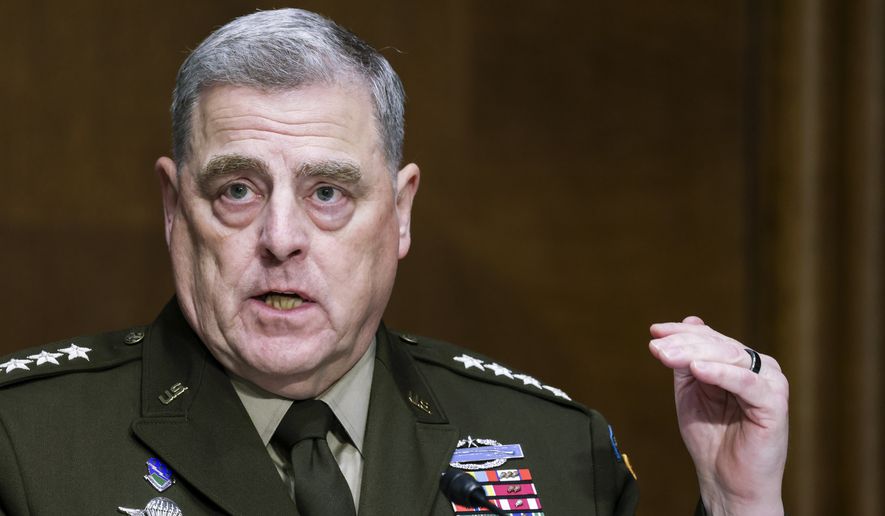The nation’s seven top military officials are deeply wary of a bipartisan push in Congress to overhaul the Pentagon’s criminal justice system and move key decisions out of the chain of command in favor of independent, professional prosecutors, according to letters made public Tuesday.
Sen. James Inhofe, Oklahoma Republican and ranking member of the Senate Armed Services Committee, asked Joint Chiefs of Staff Chairman Gen. Mark A. Milley, Army Chief of Staff Gen. James McConville, Chief of Naval Operations Adm. Michael Gilday and other top officials to provide letters stating their position on a key Senate bill, the Military Justice Improvement and Increasing Prevention Act.
The legislation would take prosecutorial decisions on major crimes such as sexual assault and murder out of the hands of commanders inside military branches, arguing the commanders have proven unable to get a handle of the growing problem in the ranks.
In their letters to Mr. Inhofe, each military official expressed serious concern about the measure, including their fears that the change could unravel the cornerstone principle of chain of command.
While Gen. Milley and other key military leaders said they’re open to new ideas to cut down on the number of sexual assault and harassment cases in the armed forces, they each strongly suggested the Senate proposal goes too far.
“It is my professional opinion that removing commanders from prosecution decisions … may have an adverse effect on readiness, mission accomplishment, good order and discipline, justice, unit cohesion, trust, and loyalty between commanders and those they lead,” Gen. Milley said in his letter. “However, in the specific and limited circumstance of sexual assault, I remain open-minded to all solutions.”
Adm. Gilday said the measure as currently written could lead to serious unintended consequences.
“My first concern is with the broad scope of offenses that would be covered by an alternate judge-advocate run process,” he said. “By removing commanders’ authority to effectively respond to many of the most serious threats to good order and discipline, … [the legislation] erodes the ability of commanders to create and maintain the environment necessary to effectively exercise mission command.”
Those comments underscore a deep divide over the bill, which enjoys strong backing across the ideological spectrum, from outspoken liberals such as Democratic Sen. Kirsten Gillibrand of New York to staunch conservatives such as Republican Sen. Ted Cruz of Texas.
But lawmakers such as Mr. Inhofe and Sen. Jack Reed, Rhode Island Democrat and chairman of the Armed Services Committee, oppose the bill as written.
Mr. Reed, a West Point grad and Army veteran, argues that the Senate should single out sexual assault cases with their reform efforts — not other major crimes such as murder.
Gen. McConville expressed a similar sentiment in his written response to Mr. Inhofe, saying the law should apply only to rape and sexual assault.
The letters released Tuesday likely will dim the bill’s prospects in the Senate.
“I don’t believe this well-intentioned bill will change anything,” Mr. Inhofe said in a statement. “In fact, I remain concerned that, as written, it would not reduce sexual assault or other crime in the slightest and would complicate the military justice system unnecessarily.”
Ms. Gillibrand and other supporters argue that it’s foolish to separate sexual assault from other offenses, arguing that doing so would essentially create two different justice systems in the military.
“You’re going to basically break apart the criminal justice system in the military,” Ms. Gillibrand told CNN’s “State of the Union” program last month. “It’s not fair.”
“It will destabilize and make, unfortunately, a mockery of the criminal justice system,” she said.
In addition to Gen. Milley, Gen. McConville and Adm. Gilday, the other officials who expressed caution in their letters are: Marine Corps Commandant Gen. David H. Berger; Air Force Chief of Staff Gen. Charles Q. Brown; Chief of Space Operations Gen. John Raymond; and Chief of the National Guard Bureau Gen. Daniel R. Hokanson.
• Ben Wolfgang can be reached at bwolfgang@washingtontimes.com.




Please read our comment policy before commenting.